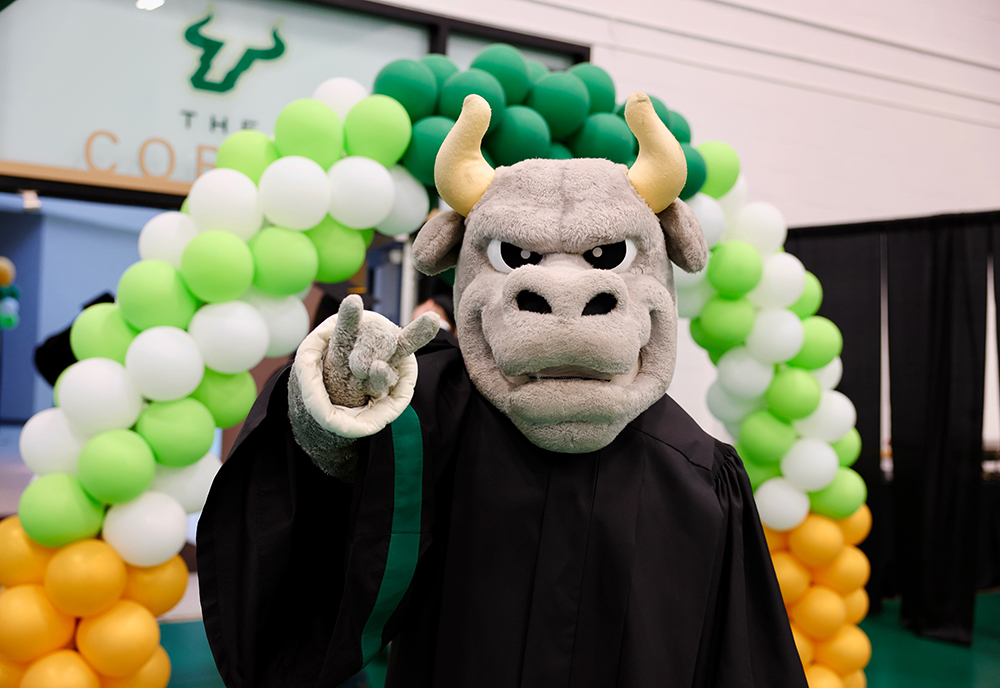A total of 288 students earned degrees from the College of Behavioral and Community Sciences (CBCS) during USF's Summer 2024 Commencement. The commencement ceremonies included 93 students receiving undergraduate degrees, 186 students receiving master's degrees, and nine students receiving doctoral degrees from CBCS.
Students graduating this semester represented the college's Department of Child and Family Studies, Department of Communication Sciences and Disorders, Department of Criminology, Department of Mental Health Law and Policy, School of Aging Studies, and School of Social Work. We're happy to recognize a few outstanding students from this graduating class.
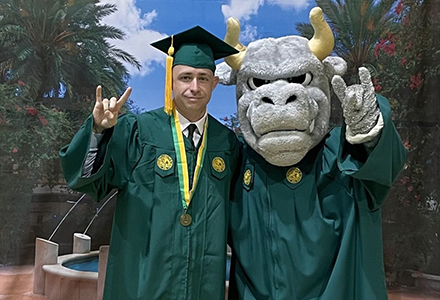
Kevin Durkin
Master of Science in cybercrime with a concentration in digital forensics
Kevin Durkin has spent a lot of time on the USF Tampa campus. In fact, he helped build
it. As part of a second job to help cover the costs of graduate school, Durkin worked
on the construction crew for the new Judy Genshaft Honors College building. At the same time, Durkin juggled being a full-time student and father to
his young children.
It was after taking a cybercrime course during his undergraduate studies that Durkin
was inspired to pursue a master’s degree.
“I went into it thinking it was going to be extremely boring, and I came away finding
it remarkably interesting and interesting enough to continue into graduate studies,”
said Durkin. “I had no idea how much evidence could be stored in computers and phones.”
From there, he became involved in the Cybercrime Interdisciplinary Behavioral (CIBR) Lab, which offers students the opportunity to work on cybercrime and cybersecurity research
projects with USF faculty. His interest and hard work paid off; Durkin is now beginning
a new career with the Department of Homeland Security. He says that he’d one day like
to become a USF professor.
What was your favorite course in the program?
Digital Forensic Criminal Investigations taught by LeGrande Gardner, PhD
Digital Evidence Recognition and Collection taught by Thomas Hyslip, PhD
“These courses taught me how to find various pieces of evidence, whether it was a
phone or computer, as well as how to examine the contents of the devices and find
digital evidence. These professors also gave me the tools to find out where and when
a photograph was taken on an iPhone, or how to examine network traffic on a device
and to see how IP addresses connect to one another.”
What will you miss most about your time as a USF student?
“I will miss everything about my time as a USF student. Being a Bull was a lifelong dream of mine. My earliest memories of USF are of my dad taking me to the football games when the football team was fairly new. He worked the games as a police officer for the city and he would bring my brother and I along, and ever since then I knew I wanted to be a part of this institution.”
What advice would you give to a new student starting in your program?
“My advice for new students starting out in the program would be to enjoy the journey. The program went too fast, and I wish it had lasted longer. Another piece of advice would be do not hesitate to ask for help and guidance from the professors. Dr. Hyslip and Dr. Gardner were a wealth of information and they helped me with a lot, both academically and professionally.”
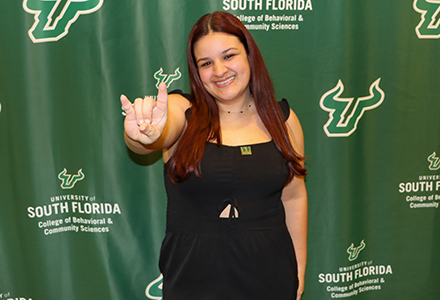
Marlee Mayo
Bachelor of Science in behavioral healthcare with a concentration in children’s behavioral
healthcare
When Marlee Mayo started her undergraduate degree at USF, she knew that she wanted to pursue a career working to support the mental health needs of children. When she found the behavioral healthcare program in the Department of Mental Health Law and Policy, she was attracted to the many career paths the bachelor’s degree program provides.
“I first started my degree in psychology because I knew that I wanted to be a therapist or counselor for children,” said Mayo. “But then I found out about behavioral healthcare and how it gives me so many options and more opportunities in the work field. I focused specifically on children because I have also known that I wanted to work with children in whatever way I could.”
After graduation, Mayo will return to her hometown of Miami to work as a registered behavior technician (RBT), assisting in delivering services and practicing under the direction of an RBT supervisor. She plans to further her education by earning master’s degrees in applied behavior analysis and either social work or mental health counseling. She hopes to one day open her own clinic.
What was your favorite course in the program?
Child Development and Trauma taught by Nicoleta “Nickie” Zenn, EdS, NCSP
“I learned so much, and it really opened my eyes to what others go through. Professor
Nicoleta Zenn is absolutely amazing and she helped me out so much when I was struggling.
You can tell she truly cares.”
What will you miss most about your time as a USF student?
“Something I will miss from USF is all the friends that I’ve made along the way and some of my professors that really helped me out and guided me through my time at USF.”
What advice would you give to a new student starting in your program?
“Advice that I would give to a new student starting in my program is to enjoy it and make the best of things. If there’s a subject in class that you don’t feel comfortable with, reach out to your teacher. They are always willing to help and support as best they can. Also, make as many friends as you can and socialize because most of the students in your class will be in your other classes.”
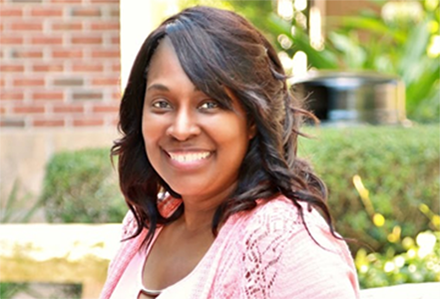
Christine Shaw
Master of Social Work with a graduate certificate in social work therapeutic modalities
After more than thirty years devoted to a career in child welfare, Christine Shaw was inspired to pursue her master’s degree in social work to deepen her impact within the community. A current employee of the Child Protection Team within the USF College of Public Health, Shaw works as a case coordinator and advocate for victims. Her expertise is in sexual abuse cases involving children as well as physical abuse and medical neglect cases involving children and teens.
“Working directly with children and families exposed me to the complexities and challenges within our social systems. I saw firsthand the transformative potential of social work interventions and recognized the need for specialized skills to better serve the most vulnerable populations,” said Shaw. “This realization fueled my commitment to furthering my education, aiming to enhance my ability to advocate effectively and enact meaningful change within the field of child welfare and beyond.”
Shaw plans to continue working in child welfare by pursuing a supervisory or director position. She says she is also eager to apply evidence-based research to her work in couples counseling and as the author of a pre-marriage preparation course.
What was your favorite course in the program?
“Although the most challenging coursework was in the research classes, I found every
course enjoyable. With over three decades of experience in child welfare, I was surprised
by the breadth of knowledge I gained after starting the Master of Social Work (MSW)
program at USF. Several instructors profoundly influenced my MSW journey and my life,
including professors Loucrecia Elmore, Mike Trepper, Lacey Karpisek, Melania Macip-Billbe, Milena Gonzalez-Lam, Erika Evans, Dr. Vickie Lynn, and Dr. Alison Salloum.
“I am deeply grateful to Dr. Maayan Lawental for approving my application for this learning opportunity. Dr. Pamela Alvarez supported me during difficult times, including when I wanted to give up multiple
times when I was caring for my mother-in-law with dementia, who passed away during
the program. Professor John Rutledge empowered me to recognize my value and never treated me like a marginalized individual.”
What will you miss most about your time as a USF student?
“I will feel nostalgic about no longer attending classes and collaborating with the instructors and my cohort. My cohort evolved into a tightly knit unit that functioned exceptionally well together. We formed enduring bonds with our instructors and received invaluable guidance from our trusted advisors, Dr. Pamela Alvarez and Professor Chris Groeber.”
What advice would you give to a new student starting in your program?
“My advice for new students starting the MSW program is to persevere. No matter the challenges, push through and complete the course, even if you're an older student. USF offers all the necessary resources for graduate student success, including excellent library services and outstanding instructional support.
“I urge you to take advantage of the opportunities to form lasting relationships with your cohort and lean on the support of family and friends. I received incredible support from my husband, children, church family, and mother. My husband, who holds a leadership position in our faith-based organization, reminded me that social work is aligned with our beliefs. He also reminded me that Jesus understands social work. This encouragement fueled my passion, which was evident in every assignment. So, to all new students, I assure you that social work has the potential to become more than just a profession, but rather a lifelong passion if you earn your degree at USF!”
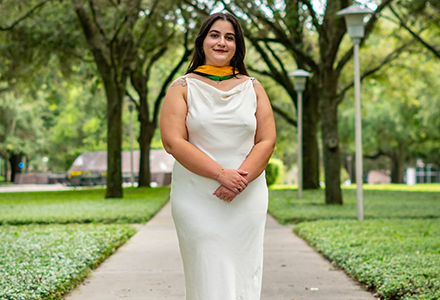
Jennifer Lopez
Master of Science in speech-language pathology
Jennifer Lopez grew up in a predominantly Latino community where she witnessed first-hand how Spanish-speaking parents were often faced with misinformation about their children’s speech. She watched as children were misdiagnosed with language impairments because their clinicians did not recognize language transfer, or the influences of one language to another, in bilingual children. This inspired her to pursue the field of speech-language pathology, where she could provide care for Spanish-speaking families from a similar cultural lens.
It makes sense, then, that during her training at USF, she has been most proud of the impact she’s made through her interactions with clients.
“I’ve had the opportunity to witness first words in babies and toddlers, see clients with cerebral palsy put together words for the first time through augmentative and alternative communication, and watch language-impaired students graduate high school when they’d been told they never could,” said Lopez. “I truly believe my biggest accomplishment is the small role I’ve played in the success of each of my clients, young or old, big or small.”
Lopez also participated in research among bilingual populations at both the Auditory Rehabilitation and Clinical Trials (ARCT) Laboratory and the Bilingual Language and Literacy (BiLL) Laboratory. At the ARCT Lab, she worked with bilingual adults with hearing loss to create Spanish language educational materials about hearing loss and hearing health. At the BiLL lab, she worked on validating a dyslexia screening questionnaire to be administered at the 6-year well visit for bilingual children.
Lopez has accepted a speech-language pathology clinical fellowship position in which she will work primarily with Spanish-speaking families.
What was your favorite course in the program?
Language Learning in the School Age Years taught by Carolyn Ford, EdD, CCC-SLP, BCS-CL
“I took this class in the first semester of my program and it really encompassed all the things that made me want to go into this field. Dr. Ford is a fantastic professor and further instilled in me (and my peers) a love for what we do.”
What will you miss most about your time as a USF student?
“The community I’ve built here. While running between clinic and classes for the last two years has been stressful, the friends I’ve made along the way helped me get through it and I’ll miss the time we’ve gotten to spend together.”
What advice would you give to a new student starting in your program?
“Not everyone in this program will have the same clinical style/approach as you and that’s okay. No style is better than another. Our field is expansive and has opportunities for all kinds of clinicians, don’t let anyone convince you otherwise!”
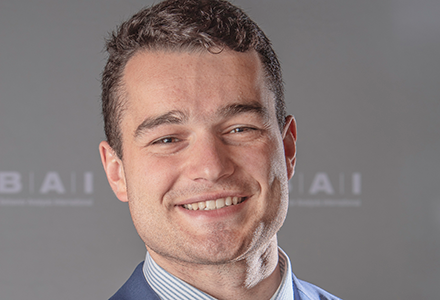
Evan Loadholtz
Master of Arts in applied behavior analysis
Evan Loadholtz has spent the past ten years working with individuals who have intellectual and developmental disabilities. One such experience was a job in the Neurobehavioral Inpatient Unit at the Kennedy Krieger Institute, assisting patients who have complex neurodevelopmental disorders and a history of engaging in severe self-injury or aggression.
"By contributing to the effective combination of medicine and applied behavior analysis, I witnessed incredible outcomes for our patients," said Loadholtz. "Interested in this approach, I decided to begin a master’s degree in ABA to further my knowledge of human behavior."
While attending the Association for Behavior Analysis International annual convention, a presentation on the pairing of medicine and applied behavior analysis (ABA) and the necessity for collaboration between these two fields inspired Loadholtz pursue his medical degree. He will attend the University of Central Florida College of Medicine this fall.
"As a physician, I aspire to serve as a liaison between the fields of medicine and ABA. I hope to contribute my knowledge of and experience with ABA to enlighten others about the utilities of this science and the implications it can have for the field of medicine," said Loadholtz. "I also plan to work alongside ABA providers, teaching them about medical or physiological factors that can have an effect behavior and work to increase collaboration between the fields in hopes of finding the best outcomes for our clients."
What was your favorite course in the program?
Applied Behavior Analysis Basic Principles taught by Faris Kronfli, PhD, BCBA-D
"This course helped lay the groundwork for my ABA knowledge and prepared me immensely to tackle more difficult topics later in the course. I found that the topics I learned also helped me at my practicum agency as I was able to better understand the methods we were using."
What will you miss most about your time as a USF student?
"The wonderful faculty and students I have had the opportunity to meet and work with."
What advice would you give to a new student starting in your program?
"My advice would be to find ways to integrate the science of ABA into areas that you are interested in. Possibilities for the application of ABA are endless, and I encourage students to continue to think outside the box with how the science can be applied."
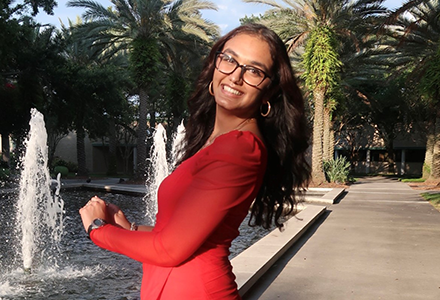
Muskaan Patel
Bachelor of Science in aging sciences
With a goal of going to medical school and pursuing a career in neuroscience, Muskaan Patel knew that understanding the needs and challenges of older adults would be essential.
"The aging population is significantly impacted by neurological conditions and disorders, and I wanted to gain a deeper understanding of these issues," said Patel. "This focus on aging sciences will better prepare me to make a meaningful contribution to the field."
Over the next year, Patel will prepare for the Medical College Admission Test, a standardized examination that is part of the medical school admissions process.
Looking back at her time at USF, Patel says she is most proud of her ability to make a friend wherever she went, especially since she spent her freshman year at home, taking online classes.
What was your favorite course in the program?
Administration of Assisted Living Facilities taught by Lindsay Peterson, PhD
"This course was quite different from what I expected. Not only did it teach practical, logistical approaches to running assisted living facilities, but it also discussed the importance of fair morals and ethics. And who better to teach this class than Dr. Peterson? I had the pleasure of working with Dr. Peterson individually on different projects, and she is the most caring and helpful professor."
What will you miss most about your time as a USF student?
"The campus and the city. Campus is absolutely beautiful and was one of the deciding factors when I chose USF. The entire campus being in the same square block is so convenient, especially with a good number of dining options as well as our own Publix. The city is also so full of opportunity and a diverse population, two things that I value greatly. I’ve never felt more at home than in Tampa, and I hope to return in the future."
What advice would you give to a new student starting in your program?
"Your professors are your greatest resource. This program is full of faculty that genuinely want to help students. Every person that I encountered was always ready to aid in any way they could, or steer me in the right direction."
Commencement this semester included the first-ever graduating class of the Master of Arts in Rehabilitation Counseling and Disability Sciences, an online program that trains counselors to work with individuals with physical, mental, emotional, and chemical disabilities. Graduates with this degree are prepared for careers as both rehabilitation counselors and professional disability specialists. Read their stories.
